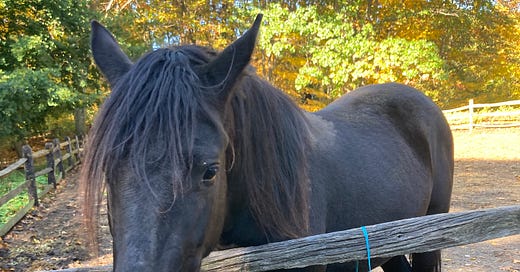The sadness of a horse
I recently asked some of my friends if they thought horses can grieve. I received a variety of answers. On one side, some think we anthropomorphize the behaviors to match our experience. Others feel animals are more emotionally sensitive than humans. And others really don’t care. Go for a ride, they say.
Meet Helix. She was the mare asked to care for the young foal, Juliet, after Juliet was weaned from her mother. A few weeks later, Helix watched Juliet being loaded onto a trailer and shipped away to her new home. Helix came to the fence when I went to check on her the next day. She is usually not affectionate. On this day she gave me hugs by wrapping her neck around my head. When I walked away, she waited at the fence. This is no mistake. This is a change in behavior. And I am not a scientist. I am an observer.
A few days later, Juliet’s mother was placed in the same paddock where Juliet last stayed. I noticed her walk away from her hay and sniff the ground for the scent of her foal. She inspected the shed to see if her baby was hiding in there. This horse never leaves her food!
Crows mourn their dead. Apes will pound the chest of their mate's lifeless body. Elephants respect the deceased by standing and gathering by the body. Animals understand loss and sadness. I wonder some days if the animals dream of being reunited with their family. I often think of the horses in my short riding career and my family of horses: Horatio, Jazzie, Wanda, Evan, Quilly, Chloe, Nigel, Patou, Charcoal, Gracy, Mylo, Forest and Logan. Each of these horses gave to me freely, without expecting any return. With most of them, we have parted ways. I feel the sadness.
Then there are moments that give me hope. I recently met a young girl and her mother. We were interviewing each other. They were curious about the experiential learning and therapeutic horse riding lessons that I offer. The girl is legally blind and eager to learn while some educators are denying her that opportunity. Several times during our conversation, she shared that she was feeling sad. Her family recently put their dog down. Often, we say this is “humane” when we kill an animal or pet that is suffering. She questioned this. She wanted answers why her dog could not be allowed to live even if the animal was suffering. I chuckled mostly because I was caught off guard and also because I felt uncomfortable with her inquiry. Later, I apologized to her.
Her question is legitimate. What is humane? This is very subjective. It is also contradictory because it is based on humanistic values. In essence, when we declare humaneness, we are playing God. I shared with the girl that my family euthanized our 18-year-old dog. I still don’t know if that was the right decision. Since then, I have learned that it is a personal decision when to euthanize a pet. It is not an easy decision.
Helix and the herd of horses at the farm feel the sadness for the loss of Juliet since she moved away and began a new life. I don’t have an instrument to measure this but I can observe it. This girl feels sadness for the loss of her dog. I believe her because I experienced the same loss. Can we meet there as emotionally intelligent beings? You, me, the girl, the horses and the animals? This is the heart of experiential learning. Maybe we don’t know? I have witnessed the compassion horses have for helping humans. They have complex social behavior. This keeps me curious, wanting to learn more.




